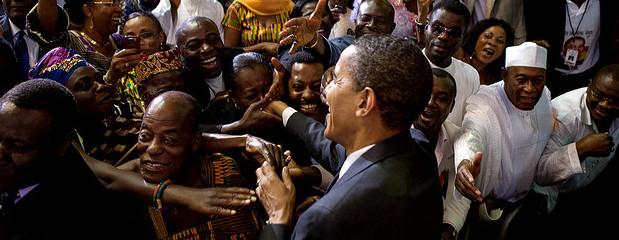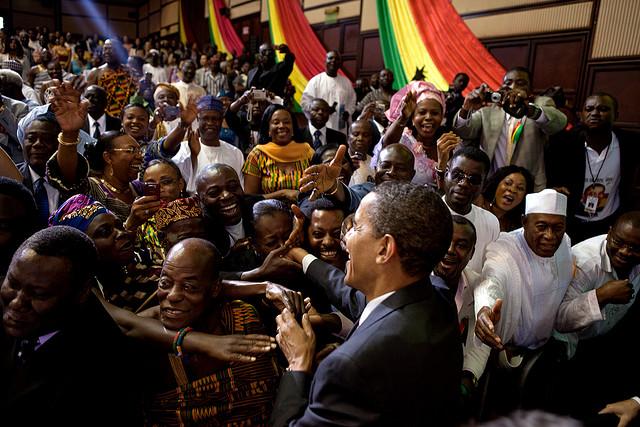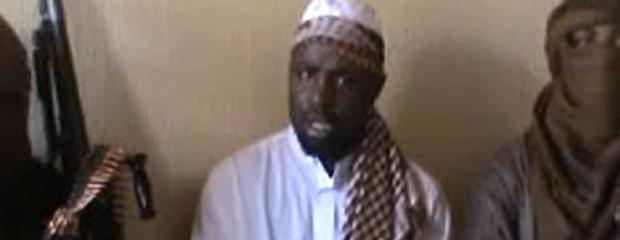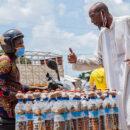10 things Obama should do on Africa before leaving office

1) Visit Nigeria.
After seven years in office, US President Barack Obama has engaged more broadly on Africa than any previous president. He has elevated and transformed America’s engagement with Africa, traveling widely across the continent, championing the renewal of several old programmes, and launching a series of new initiatives that could help speed-up Africa’s development.
Obama fought successfully for the renewal and extension of the African Growth and Opportunity Act (AGOA), America’s most important trade legislation with the continent. He hosted the first US-Africa Leadership Summit, attended by 37 heads of state. He established the Young African Leaders Initiative, a programme that will bring 500 young African entrepreneurs, professionals and community organisers to the US each year for five weeks of leadership, organisation and management training. And he established several programmes, including: “Power Africa” which aims to expand electrical access across the continent; “Feed the Future” to increase household food production and generate a green revolution; and “Trade Africa” to expand trade between Africa and the US.
Obama has done a lot, but with one more year remaining in the White House, there are still a few things he should do before he leaves.
1) Visit Nigeria
Obama has travelled to Africa five times during his presidency, but he has not visited Nigeria, the continent’s most populous country (with an estimated 180 million people) and biggest economy (with a GDP that’s about a third higher than South Africa’s). It is also Africa’s largest Muslim country and biggest electoral democracy.
The president has visited every major country on the continent except Nigeria, and it would be a mistake for him to leave the White House without a stopover in Lagos or Abuja. Not visiting Nigeria is roughly akin to an American president visiting Europe several times and not visiting Germany or the UK.
Some have suggested that security may be a concern because of Boko Haram, but if the president can travel safely to Nairobi, where al-Shabaab has carried out high profile attacks in the centre of the city, he should be able to travel safely to Abuja or Lagos. He is bound to make one more trip to Europe, and a stop in Nigeria – similar to his 2009 visit to Ghana – would not be a major diversion.
2) Co-host a regional summit on democracy in West Africa
Strengthening democratic institutions, promoting good governance and supporting free and fair elections have been priorities for the Obama administration in Africa. During his first official visit to the continent as president in July 2009, he spoke eloquently before the Ghanaian parliament about the need to create “more strong institutions, not more strong men.”
With a growing number of African leaders attempting to extend their terms in office, democracy remains fragile across the continent. The president could give democracy in Africa a boost and reaffirm America’s commitment to political progress by hosting a conference in West Africa with the freely-elected leaders of Benin, Burkina Faso, Cape Verde, Liberia, Niger, Nigeria, Mali, Mauritania, Senegal, Sierra Leone and Togo.
3) Support Nigeria’s permanent membership in the G20
Obama has said that he wants to ensure Africa has a place at the table to participate in the deliberations concerning major global political and economic issues. One way to accomplish that is to expand or reorganise the G20 group of nations to include Nigeria as a permanent member.
Nigeria is already more important than several of the current G20 members, notably Argentina and South Africa, and over the next two decades it will become one of the world’s mega states, eclipsing several other G20 members in the size of its economy, population and regional influence. It would also be one of the G20’s largest democracies. The administration should make the inclusion of Nigeria a priority over the next 12 months.
4) Press for the passage of the Electrify Africa legislation
Power Africa is one of Obama’s most important signature initiatives. In the world’s most energy deficient and starved continent, the programme is intended to increase Africa’s power output by 30,000 megawatts over the next decade or two.
But like a number of recent White House initiatives, Power Africa is not backed by any legislative mandate and could be easily brushed aside after Obama leaves office. The programme enjoys bi-partisan support in Congress and the administration needs to work with congressional leaders to prioritise the passage of the Electrify Africa legislation. At the same time, the administration needs to create a senior level ‘Power Africa tsar’ to manage the project and consider moving interagency responsibility for oversight from USAID to a cabinet level department.
5) Instruct USAID to establish a permanent democracy fund
If democracy promotion is an important priority, it should be funded adequately and on a long-term basis. Today that is not the case. Funding for democracy has declined sharply during Obama’s second term despite his recent speeches in Nairobi and Addis Ababa, and at the UN General Assembly in New York.
Dedicated and hard-to-reprogramme funds should be allocated to strengthen African judiciaries and legislatures, promote civil society groups and the media, assist women’s organisations and youth groups, and support domestic and international election monitoring. Funds should also be made available to assist local organisations to undertake parallel vote counts, aid local election commissions, and prevent pre- and post-election violence.
6) Invite Tanzania’s newly-elected President John Magufuli to the White House
Tanzania is one of the most populous states and the largest democracy in East Africa. It is also one of the biggest recipients of US development assistance and a participant in all of Washington’s major economic initiatives.
In late October, Tanzania held presidential and parliamentary elections. The elections on the mainland went well, but those on the island of Zanzibar were disputed. John Pombe Magufuli, a reform-minded academic-turned-politician, was elected without dispute, making him Tanzania’s fifth elected president in a row. Although the Zanzibar election remains unresolved, it is important to reach out to Tanzania’s new president early in his tenure to continue to foster the strong relationship between Dar es Salaam and Washington. This is particularly important since Magufuli does not have any major ties with the US.
An early visit to Washington could consolidate the growing economic and development ties between the US and Tanzania and lend encouragement to the continuation of the country’s democratic progress, including finding a sustainable resolution to Zanzibar’s electoral issues.
Tanzania also has a critical role to play in East African peacebuilding issues, particularly in Burundi and the eastern Congo. Early political consultations with Magufuli and his new foreign minister, Dr. Augustine Mahiga, could prove valuable in promoting stability in the Great Lakes region.
7) Send Secretary of State John Kerry to the Great Lakes
The Great Lakes Region of Central Africa is one of the most volatile and unstable in Africa, with daily political and ethnic violence in Burundi, and with the leaders of Rwanda, DRC and Republic of Congo threatening to extend themselves in office in violation of their constitutions.
Although time is running out, there is still an opportunity to prevent further democratic backsliding and the serious instability and violence that will almost certainly be unleashed – as we are already seeing in Burundi. High level engagement with the leaders in the region is required. An extended visit by Secretary Kerry to the DRC, Uganda, Rwanda and Burundi would be a strong signal of Washington’s concern and interest in the region’s negative political and security trajectory. Without serious engagement with the leaders on the ground, there will be no meaningful progress.
8) Open a US consulate in northern Nigeria and a full embassy in Mogadishu
The establishment of a US consulate in northern Nigeria is long overdue. More than half of Nigeria’s 180 million people live in the northern part of the country, an area of serious political and security concern. It is also the largest Muslim region in Africa and the largest Muslim region in the world where there is no full-time US diplomatic presence.
A US diplomatic mission would advance long-term political, economic and security interests in the region and help Nigeria deal with the economic, social and security challenges it faces there. A consulate in Kaduna, which once had one, or Kano would convey a strong signal to the Muslim community that Washington genuinely cares about the people in the region.
Once the global poster child of a failed state, Somalia has made significant progress over the past seven years. In recognition of the progress, the US re-established formal diplomatic relations with the Somali government in Mogadishu in January 2013.
Before he leaves office, Obama should take one more step. He should reaffirm Washington’s commitment to Somalia and recognise the country’s continuing progress by appointing an ambassador and opening a small, secure diplomatic embassy compound in downtown Mogadishu.
9) Elevate US diplomatic relations with Sudan
Relations between Washington and Khartoum have been prickly and frequently difficult for over two decades and the US has not had a fully accredited, Senate-approved ambassador in Sudan since 1997.
The Khartoum government has not been a good international actor. (Nor have Cuba, Myanmar or Iran.) The regime in Sudan has carried out mass atrocities in Darfur, prevented UN organisations from delivering food aid and humanitarian assistance to those in need, and meddled in the affairs of several of its neighbours.
But US-imposed comprehensive sanctions on Khartoum have not significantly isolated the country nor weakened its government. The US should review its current policies and consider elevating its diplomatic relationship to full ambassadorial status in order to expand dialogue and probe for new openings to resolve some of the country’s domestic and regional issues. The US can do this while maintaining its sanctions regime on the government and its demands that President Omar al-Bashir address the serious human rights charges against him.
10) Provide a status report on the results of the US-Africa Leadership Summit
The US Africa Leadership Summit has been one of the high points in the Obama administration’s engagements in Africa.
Leaders from 50 different countries participated in this first-of-a-kind gathering in Washington. A number of new programmes were announced and a major business conference associated with the summit brought dozens of senior American business leaders into direct contact – many for the very first time – with African heads of state and prominent business leaders from the continent.
The administration has never released a comprehensive report on the summit or a one-year progress report on the implementation of summit agreements. The issuance of some type of status report would be a useful vehicle for identifying summit objectives and initiatives as well as tracking the progress of the administration’s efforts. The administration should do everything it can to sustain the goodwill and policy initiatives that emerged from the summit to help ensure that it does not become a one-off event.
The administration should be applauded for its continuing efforts to promote greater American trade and commerce with Africa. The president has already announced that he plans to host another US-Africa Business Summit similar to the day-long event his administration hosted during the 2014 Leadership Summit.
The Business Summit is important, but it should not be the only thing on Obama’s Africa agenda for 2016. He has time to do more, and he should. 12 months is a long time in the life of an administration and his foreign policy team should be building a more robust African agenda for his last year in office.
Johnnie Carson was the US Assistant Secretary of State for African Affairs from 2009 to 2012. He is currently a Senior Advisor at the United States Institute of Peace and a Senior Fellow at the Jackson Institute at Yale University.







Good that Johnnie Carson included Sudan on list, but he has been very mealy mouthed and littered his Sudan section with standard US outdated – and in many cases plain wrong – brickabats against gov; eg his remarks about Sudan meddling – what’s that about?? Even other US gov officials have quietly applauded Sudan govs relatively restrained stance in the South Sudan conflict. And, in any case, does Sudan even compare to his protégé Uganda in that regard – DRC, Rwanda, and outsized role in South Sudan -? No.
His remarks on domestic situation in Sudan are also stale bread – Darfur etc, ditto his covert remarks about Bashir facing ICC l; don’t think that anybody would say that his right to an impartial trial by that court is now possible in any case. Also, “domestic concerns” are already being “explored” by the national dialogue – so his remarks there are behind the curve. Also unconscionable that Mr. Carson fails to mention taking Sudan off the terrorism list for the simple reason that even the US State Dept own reports say that Sudan remains a US counter terrorism partner. All in all, in cold light, while Mr. Carson’s call for relaxation and re-evaluation of Sudan US relations is welcome, his suggested concessions are hardly charitable – based as they are on US ‘reflexology’ towards the Sudanese gov.
I Adam
Sudan
This is an interesting article that raises some good points. Overall, however, the arguments and recommendations reflect the timid approach to Central Africa and the Great Lakes that was so characteristic of Ambassador Carson’s leadership when he served as US Assistant Secretary of State for African Affairs.
On his watch, US engagement in Africa avoided areas that needed US leadership the most, i.e. DRC, Great Lakes, Congo-Brazza, Chad…Outsourcing the hard work to either the ambassadors or special envoys, who were no match to the strongmen. The current crisis in DRC can be traced directly to that tepid engagement, which shied away from tough situations.
Now Carson misses the mark and advocates for a regional summit on democracy in West Africa, a region that has made impressive progress on the democratic front, from Senegal to Niger to Liberia.
No West African president is talking about staying in office beyond his/her constitutionally mandated terms. Such a summit would amount to preaching to the choir and the converted, in essence taking the easy route and underutilizing US leadership.
Leadership means facing difficult challenges and making tough, principled decisions. Central Africa, the region that Carson so conveniently avoids, is the region that is in greater need of increased US engagement, a visit by President Obama and a regional summit on democracy.
Central Africa, which includes Equatorial Guinea, Chad, Cameroon, DRC, CAR, Congo Brazzaville, South Sudan, Rwanda, Burundi, Uganda and Angola, is in deep leadership, democracy and security crisis. Presidents in this region show total disregard for the electoral process and no respect for the constitution. Collectively, these leaders fuel regional instability.
Secretary of State John Kerry already visited the region in 2014, with stops in Juba, Kinshasa and Luanda. In Kinshasa, he publicly called for President Joseph Kabila to respect the constitution and step down at the end of his second term in 2016. It is not clear what impact another visit by Kerry would have.
On the other hand, a visit by a US president would show a greater US commitment and a summit on democracy would go a long way in heartening civil society and opposition groups. Central Africa is underperforming by African standards, which is quite alarming.
Ambassador Carson claims that President Obama has visited every major country in Africa. That is not true. DRC and Angola are two major countries that the president has not visited.
In fact, Power Africa, the program that Ambassador Carson touts as a success does not include the DRC, a country that holds nearly 50 percent of Africa’s hydroelectric energy potential. How does one light Africa without DR Congo? That is a mystery.
Quite positive in calling for elevating diplomatic relations with the Sudan;but this would be too little ,very late.What is needed is a root and branch overhaul of the policy.To his credit President Obama has already eased some sanctions,as has President Clinton.Sanctions should be wound down as the former envoy General (ret)Scott Gration said in a senate testimony because there is no US intelligence evidence of Sudanese terror sponsorship.
The article does not take into consideration the changes that took place after the (Western brokered) CPA of 2005.Change of leadership(Dr Turabi removed) and change of policies that enabled a Christian to become first Vice President and accepted the result of the Referendum that led to a peaceful declaration of the Republic of South Sudan.
As for Darfur,it is now a building site ,with hundreds of schools,offices and projects being built or rebuilt.In South Darfur there is a now a Qatari hospital run with solar energy and a Turkish teaching hospital .Electricity in Nyala is better than Khartoum.
JEM fighters are now complicating the tragic conflict in South Sudan. Other rebels are in Libya.
A question :despite the proven and documented atrocities in the South Sudan conflict,why was the ICC not mentioned or asked to investigate.?This shows that the case against the Sudan and its president was politically -motivated.
What the article does not mention is the fact that US business is also a loser in the Sudan.
In a recent article Andrew Natsios has observed that US policy towards the Sudan was not influenced by diplomacy or economic interests as it should have been.
The statement that the Sudan has meddled in the affairs of neighbouring countries is surprising.The Sudan has been a victim of neighbours giving rebels safe haven and playing the role of transit stations for arms sent to the first and second armed rebellions in the South.The same thing happened in the case of Darfur rebels.